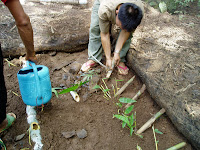Last month I mentioned a community savings and loan system called VICOBA, short for Village Community Bank. I thought maybe this month I could just give you a brief description of what VICOBA is and how it works.
What is VICOBA? VICOBA is a savings and loan system we are promoting amongst farmers in the Kilimanjaro region of Tanzania. VICOBA, and similar systems are now being used throughout Africa with great success. VICOBA groups are community based, and typically rely on no outside money. A group (in our case, typically 30 people), will get together, draft they own bylaws, elect their own leaders, and initiate a short term investment cycle which lasts one year or less. In our case, we (Floresta) provide intensive training to the group for several months before the investment cycle is initiated and continued training and followup during the investment cycle.
How does the investment cycle work? At the beginning of the cycle, every member deposits an amount pre-agreed upon by the group. Every week after that, the group meets, and at those meetings every member is required to deposit at least one share in their savings account. Again, the share size is pre-determined by the group and written into the bylaws. The group then takes this fund (which increases every week), and uses it to make loans to individual members. Loans are typically for less than 6 months and at a locally competitive interest rate. In addition to interest from loans, groups will also increase their capital by the collection of fines on bylaw infractions (eg. being late to a meeting will cost you around 1 dollar US), and through fund raising events which the groups themselves organize.
What happens with all this money? Well, it's kept in a box. This is a heavy metal box with three locks on it, and the group selects three reliable members to be keepers of the three keys. At every meeting the box is brought out of hiding by the three members, and all the cash inside is counted. The meeting then opens and members deposit their weekly shares. At the end of the meeting, the cash is recounted, and the boxed relocked by the three key-keepers in the presence of the entire group. Transparency is a big deal in VICOBA as you can tell.
What's the success of this? I would have to say pretty remarkable. For example, in a recent investment cycle (the graduation which I mentioned last time), one member invested the Tanzanian Shilling equivalent of 141 US dollars over the 12 month period, and at the end of the cycle received the approximate equivalent of 160 US dollars. This works out to about a 13.5% return. I should point out that not every member invested as much, but every member would benefit from the 13.5 percent return. This type of result is drawing quite a bit of local attention, and even some imitation groups.
Photo is the VICOBA savings box being opened at the beginning of a meeting













